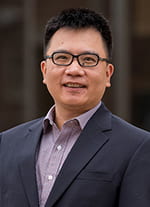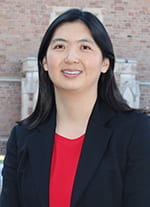In China, new research with Child Development Accounts aims to build families’ capacity for managing the cost of autism services.
For the families of children with autism, medical costs can be daunting and have profound implications for family budgets. In mainland China, there are over 2 million children with autism, and a large proportion of them are not covered by public medical insurance. New research seeks to build capacity for managing such costs and to provide additional supports for the families.
Through a pilot study led by the Center for Social Development (CSD) in Washington University’s Brown School, 1,000 mainland children with autism will receive Child Development Accounts, or CDAs, and their families will be offered education on health, autism services, and finances.
“This research extends the growing body of evidence on asset building as a fundamental social policy strategy,” said Michael Sherraden, the study’s principal investigator. Sherraden is the George Warren Brown Distinguished University Professor at Washington University and CSD’s Founding Director.
Funding for the pilot comes from a Global Incubator Seed Grant awarded by Washington University’s McDonnell International Scholars Academy and the Office of the Provost. Insights from the pilot will inform a randomized, controlled trial of the CDA intervention.
CDAs are instruments for building assets to support family investments in education, health, homeownership, and other developmental priorities.
Originally proposed by Sherraden in the 1991 book Assets and the Poor, the account is typically opened automatically near the time of a child’s birth and seeded with a substantial deposit. In addition to contributions from the child’s family, the account receives deposits from public and nonprofit sources, with greater deposits for disadvantaged children. Assets in the account grow with the child.
Worldwide, over 15 million children have assets in such accounts. CDA policies have been implemented in a number of U.S. states and several countries. All of the policies have been informed by consultation with CSD experts, based on evidence from SEED for Oklahoma Kids, the long-running randomized CDA experiment.
For the pilot study, CDAs will take the form of commercial insurance accounts, which are common in China. The accounts are structured to offer insurance coverage for costs from unintentional injuries and autism-related health care services. Universal life-insurance coverage will provide for children upon the death of their parents, and an annuity will provide resources for mid- to long-term health needs.
The accounts will be opened with initial seed deposits from nonprofit organizations, which will also donate funding for savings matches to be paid when a child’s family makes deposits. Assets in the accounts will generate investment earnings.
“China is very interested in effective social policy innovations,” said Jin Huang, Professor in the Saint Louis University School of Social Work and Research Professor in the Brown School. Huang is the Faculty Director of CSD’s work in Asia and lead scientist for the pilot.
The study will examine the feasibility of insurance-based CDAs, the health services used by children with autism, and the financial outcomes of the CDA intervention. To conduct the research, CSD is collaborating with experts at Peking University, Tsinghua University, Beijing City University, China Central University of Finance and Economics, and New York University, Shanghai.
“We are grateful for the support from the McDonnell Academy to enable us to conduct this new pilot research with our Chinese partners,” said Li Zou, CSD’s International Director and project director for the pilot. “We look forward to generating meaningful research evidence to make a positive impact for the children with autism in China and beyond.”
The pilot builds upon CSD’s long engagement in China and other parts of Asia.
In the early 2000s, the center collaborated with the Chinese Academy of Social Sciences to evaluate an asset-building demonstration project in Xin Jiang Uygur Autonomous Region. CSD, Hong Kong Polytechnic University, and Sichuan University fielded an asset-building intervention in 2008 as part of recovery efforts after a devastating earthquake in Sichuan Province. CSD experts provided technical assistance with the design and launch of the Hong Kong Child Development Fund in 2008.
In recent years, CSD’s engagements in Asia have focused on education, an emphasis also evident in the new pilot. Through the Financial Capability and Asset Building initiative, the center has worked to improve the financial knowledge and well-being of vulnerable populations by delivering instruction and supports through human service channels. With a curriculum developed at the center, CSD experts and partners have been equipping social workers with basic financial skills for guiding clients in China, Singapore, and elsewhere.
Developed in consultation with the China Disabled Persons’ Federation and the China Banking and Insurance Regulatory Commission, the new pilot’s education component is designed to cultivate basic knowledge about autism services and supports, as well as a sound understanding of household financial management and available products and services.
“Our goal is to improve the health of millions of vulnerable children in China and the well-being of their families,” said Sherraden. “We also see the potential to scale up CDAs and to advocate for health-care policy changes, with implications for policy in other countries.”
“Building upon our previous work and our partnerships in China, those goals are within reach,” Sherraden said.



